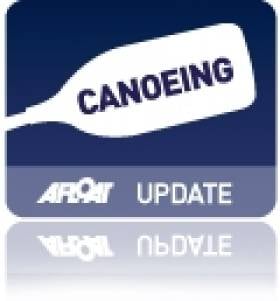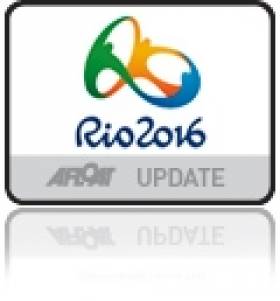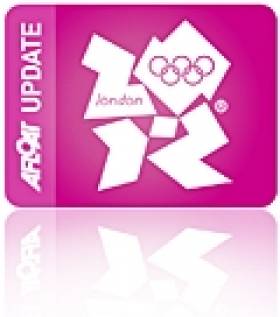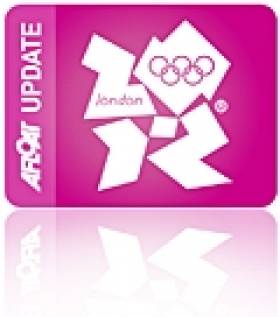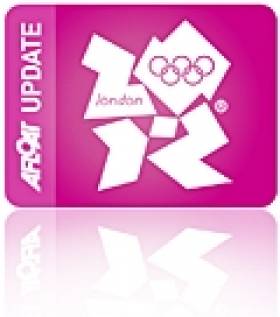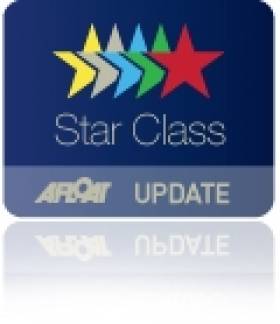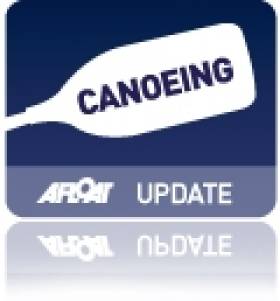Displaying items by tag: Olympics
Heurteau Ranked 10th in 2012 Canoe Slalom World Cup Standings
#CANOEING - The Irish Times reports that Ciaran Heurteau is 10th in the World Cup standings for 2012 in the K1 slalom.
The Irish paddler, raised in Paris, has competed in all five Canoe Slalom World Cup events this year, with his best result of 5th place at Pau in France in mid summer, as previously reported on Afloat.ie.
More recently the 25-year-old finished 15th at last weekend's event in Bratislava, Slovakia.
Heurteau, who was beaten to a spot at the London Olympics by Eoin Rheinisch, is at 47th place in the latest International Canoe Federation (ICF) world rankings, which are decided from results over a two-year period.
He stands nine places ahead of Rheinisch, who lost out on a place in K1 final in London after a disastrous 50-second time penalty in his semi-final run.
Irish Sailing's Sister Act Plan on Rio 2016
#RIO 2016 – It's well known that Annalise Murphy was barely off the water in Weymouth before she committed herself to a further few years sailing hard in the Laser Radial class for the 2016 Olympic Games in Rio de Janeiro.
What's probably less well known is that older sister Claudine has also set her sights on Brazil, campaigning in the new Olympic kitesurfing class.
News of the double campaign in the Murphy household was revealed in The Irish Times by Pamela Duncan prior to Annalise's medal race a week ago.
Claudine says there was "big rivalry" between her and Annalise as both pursued success in the Laser Radial, but they also realised that only one of them could represent Ireland in the class at Olympic level. Annalise showed the potential, and Claudine turned her hand to a different class.
“She’s my best friend in the whole world,” says Claudine, who flew in to support her sister from the Caribbean where she is already hard at work campaigning for a spot at the Rio Games in kitesurfing - a somewhat controversial addition to the Olympic schedule.
Meanwhile, Annalise Murphy and the Irish sailing team were welcomed home with a guard of honour at the National Yacht Club in Dun Laoghaire yesterday evening.
Annalise also announced plans to take things relatively easy for the next year, returning to UCD next month for a science degree.
"I deferred it three years ago as I didn’t want to put a half-hearted approach into college or sailing," she said. "I’m older now and I feel like I can manage things better.”
Sailing Medals Could Bring In Big Sponsorship
#OLYMPICS - Ireland's impressive showings in aquatic sports at the London Olympics may be the key to bringing in much needed corporate sponsorship, as the Evening Herald reports.
Sailing in particular has yet to capture the public's imagination in the same way as track and field athletics or boxing.
But with 22-year-old Annalise Murphy riding high in first place in the Laser Radial standings and on course to take the gold medal, the sport's profile is rising - and headline sponsors will surely come following the lead of her personal sponsor Tayto, and new sailing supporter Providence Resources.
The oil exploration firm - which recently struck a black gold bonanza off the south coast - signed on as a "generous" sponsort of the Irish Sailing Association (ISA) earlier this year, which is just the ticket for what can be an expensive sport.
ISA performance director James O'Callaghan said that big-ticket sponsorship would be a welcome addition to the "vital" grants received from the Irish Sports Council.
"The results that Annalise has had so far show how our teams are able to compete on an international level," he added.
"I think it's a good package for any sponsor. They are a really young team with Annalise, the 49ers and then we got a medal in the Youth Worlds in July for the first time in 16 years."
The Evening Herald has more on the story HERE.
Keep Up With Ireland's Aquatic Olympians On TV
#OLYMPICS ON TV - Sailing action continues for another week at the London Olympics, with BBC Three and BBC HD being the best places to catch the race action on TV.
First place Annalise Murphy will be racing her Laser Radial this afternoon and tomorrow - races that sadly will not be televised, according to our sources - but her class' medal race scheduled for Monday 6 August at 2pm, with live coverage expected on RTÉ and BBC.
In the 49er, Matt McGovern and Ryan Seaton are half-way through their race schedule and will be in action in three races today 3 August, with two apiece on Sunday 5 August and Monday 6 August, and with the medal race in their class set for next Wednesday 8 August at 2pm.
In the 470, Scott Flanigan and Ger Owens have just got their campaign underway and will be racing this afternoon, tomorrow 4 August, Monday 6 August and Tuesday 7 August, with the medal race sheduled for Thursday 9 August at 2pm on BBC One.
James Espey in the Laser will also be in action today and tomorrow from 1pm, with the medal race in his class set for Monday 6 August at 2pm.
Meanwhile, David Burrows and Peter O'Leary will be looking to put their recent disqualification behind them this afternoon, with the medal race in their Star class to be contested on Sunday 5 August at 2pm on BBC Three.
In canoeing, Ireland's last medal hopes rest with Andrzej Jezierski in the men's C1 200m. The Polish native will be in action in the first heat of the day on Friday 10 August at 9.50am, with the semi-finals set for 11.15am should he qualify, and the finals taking place on Saturday 11 August at 9.45am.
In rowing, Sanita Puspure easily outclassed the field in her semi-final race, crossing the line 10 seconds ahead of her closest rival, and the Latvian heads into tomorrow's finals in lane 3 of the C group at 10.20am on BBC One and RTÉ Two.
#KITESURFING - The International Sailing Federation (ISAF) has responded to the legal challenge from the International RS:X Class Association to its decision to cut Olympic windsurfing from the Rio games in 2016 in favour of kitesurfing.
As previously reported on Afloat.ie, kitesurfing was given two medal events at the next Olympics following a mid-term meeting of the ISAF Council in Italy nearly three months ago.
In a statement, the ISAF said it "intends to fully defend the decision of the ISAF Council, which was made in accordance with the ISAF regulations and the defined decision making processes of the ISAF."
Sailing's world governing body said it was "extremely disappointed that this course of action has been taken" - rather than the "normal submission process" to request the council to reconsider its decision at the ISAF AGM in November - "not least because responding to legal claims will incur substantial and unnecessary legal costs for ISAF and for the class itself."
There has been some controversy surrounding the decision to include kitesurfing over windsurfing at the Rio games after claims that the council vote was married by "language difficulties" among the Spanish delegate.
Spain, a long-time windsurfing stalwart, surprised many by joining the 19-17 vote in favour of the newer discipline, which was supported by Ireland's John Crebbin.
Kitesurfing Too Dangerous For Olympics Says Expert
#KITESURFING - The decision to include kitesurfing in the 2016 Olympics is a big mistake, a leading expert in the sport has said.
Amit Inbar, who represented Israel in windsurfing at the 1992 and 2000 Olympic Games, told news agency Reuters that kitesurfing is "10 times more dangerous" than windsurfing, and that the International Sailing Federation (ISAF) has failed to appreciate that.
"People have died in kitesurfing," he said, claiming that 130 people had been killed in the sport worldwide. |I'm really scared that we are going to see some very bad accidents."
Meanwhile, Israel's sailing head Yehuda Maayan claims that the vote among the ISAF board to cut windsurfing from the Olympics in favour of kitesurfing was marred by "language difficulties" experienced by the Spanish delegate at the meeting.
As previously reported on Afloat.ie, windsurfing stalwarts Spain surprised many by joining the 19-17 vote in favour of the new discipline, which was supported by Ireland's John Crebbin.
A two-thirds majority would be required by the windsurfing lobby to overturn the decision at the ISAF’s annual general meeting in Ireland this November.
Reuters has more on the story HERE.
#sailforgold – Annalise Murphy takes a bronze medal back to Dun Laoghaire tonight after winning the Laser Radial medal race at the Sail for Gold regatta in Weymouth today. The 22-year old Dubliner has repeated last year's performance in Weymouth to take bronze for the second year running at the Olympic venue event.
Today's final medal race win brought her from fifth to third overall, beating world champion Marit Bouwmeester of Holland in to the bargain.
Ireland stands to add to its tally later today with Skiff sailors Ryan Seaton and Matt McGovern will be next to sail in the 49er medal race this afternoon. Peter O'Leary and David Burrows, currently in third place in the Star class, will also be hoping for a podium place.
More results as we have them.
Windsurfers Must Make Way for Kites at 2016 Olympics
#KITESURFING - Windsurfers have vowed to battle to overturn the decision to cut their sport from the Olympic Games in 2016 in favour of kitesurfing.
As the Independent reports, kitesurfing has been given two medal events at the 2016 games in Rio de Janeiro, following a mid-term meeting of the International Sailing Federation (ISAF) in Italy.
"I am raw, sore, and shell-shocked by the decision," said Rory Ramsden, secretary of the RSX board association, who was also said to be rocked by the turning of the tide against windsurfing at the emotionally charged meeting.
Ireland's John Crebbin was among those who gave impassioned speeches in favour of kitesurfing before the board voted 19-17 in favour of the relatively new discipline - a decision strongly supported by the USA, Bulgaria, Greece and even windsurfing stalwarts Spain.
The French contingent, meanwhile, was reportedly "devastated" at the news.
A two-thirds majority would be required by the windsurfing lobby to overturn the decision at the ISAF’s annual general meeting in November.
The Independent has more on the story HERE.
Danes Deny O'Leary and Burrows Bronze in France
#STAR WORLDS – A 14th scored in today's final race has dashed hopes of an Irish medal at the Star World Championships in Hyeres on the South of France but Peter O'Leary and David Burrows will take great confidence from their consistent performance in some tricky conditions this week.
The world championships in Olympic year is regarded as one of the most accurate and final guages of performance before July's London Olympic regatta. The fourth place Irish finish is a significant improvement on their world championship record to date.
In a final race upheaval the British pairing of Iain Percy and Andrew Simpson who were the regatta leaders for most of the week finished second with Brazil's Robert Scheidt and Bruno Prada taking the overall honours. Denmark's Michael Hestbaek and Claus Olsen jumped from fifth position in the regatta to win bronze after a third place finish today.
O'Leary's and Burrows fourth place finish is one of few exceptional finishes for Irish crews at Olympic class World championships eclipsed in the Star class only by a Bronze medal finish by O'Leary's Royal Cork club mate Mark Mansfield and David O'Brien in 2000.
#CANOEING - The Irish Times profiles Irish canoeing contender Ciaran Heurteau ahead of the European Championships in Germany this weekend, where he hopes to claim his place at the 2012 Olympics.
Born in Paris to a Northern Irish mother, Heurteau has competed for Ireland since 2006, and is back to fighting fitness following a shoulder injury last year and a lacklustre World Championships performance in September.
“Looking at how I am coming into this race and how I came into the race at the Worlds, it’s a different feeling," he says. "I have never come into a race as prepared as I am now."
Heurteau joins Patrick Hynes and Eoin Rheinisch - who finished fourth in the K1 slalom in Beijing four years ago - among the Irish contingent in Augsburg for the championships, which began yesterday.
Meanwhile, among the women Olympic hopefuls on the team is Northern Ireland's Hannah Craig, who along with Heurteau and others was interviewed by BBC Sport this week.


























